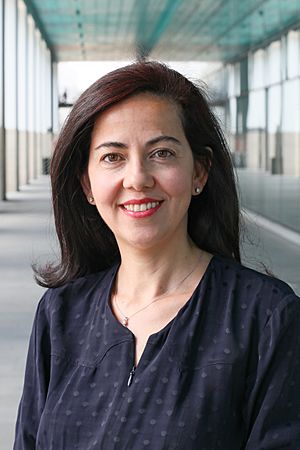Hatice Altug facts for kids
Hatice Altug (Turkish: Altuğ; born 1978) is a brilliant Turkish physicist. She is a professor in the Bioengineering Department at École Polytechnique Fédérale de Lausanne (EPFL) in Switzerland. She leads a special lab that studies tiny light systems called bio-nanophotonics.
Her research helps us understand how light can be used to find tiny things. She focuses on creating very sensitive sensors. These sensors can find biological materials without needing special labels. She has even developed low-cost sensors that can find viruses like Ebola. These sensors are very helpful, especially during pandemics, because they work well in tough conditions.
Professor Altug has won many important awards. These include the United States Presidential Early Career Award for Scientists and Engineers. She also received the Adolph Lomb Medal from The Optical Society of America. She is recognized as a top expert in her field.
Learning and School
Hatice Altug was born in 1978 in a place called Karamanlı in Burdur, Turkey. She finished high school in Antalya in 1996.
She then went to Bilkent University in Ankara, Turkey. She studied physics and earned her degree in 2000. She was so good that she received a full scholarship for her studies.
Later, in 2007, she earned her PhD in applied physics. This was from Stanford University in California, U.S. While at Stanford, she worked with Professor Jelena Vučković. She focused on laser systems and optical tools.
Her Amazing Career
After her PhD, Dr. Altug worked as a postdoctoral fellow. She was at the Center for Engineering in Medicine at Harvard Medical School. From 2007 to 2013, she taught at Boston University. She started as an assistant professor and later became an associate professor.
In 2010, she received a special award called the Faculty Early Career Development (CAREER) award. This came from the National Science Foundation. She also shared her discoveries with the public. She did this through places like Boston’s Museum of Science. She also worked with local education programs.
She added new experiments to her courses at Boston University. These experiments helped students learn about nanotechnology. In 2010, Popular Science magazine named her one of their “Brilliant 10.” This award goes to top researchers under 40.
In 2011, the IEEE Photonics Society gave her the Young Investigator Award. This award honors people who make great contributions to photonics before age 35. She was recognized for her amazing work. She found ways to control light at a very tiny scale. This greatly improved how biosensors work.
Dr. Altug received OSA’s Adolph Lomb Medal in 2012. She earned it for her breakthrough work. This included integrated optical nano-biosensors and nanospectroscopy. Her work used tiny light-matter interactions (nanoplasmonics) and very small fluid channels (nanofluidics). She also used new ways to create tiny structures (nanofabrication).
She was also honored by President Obama in 2011. She was one of 94 researchers to get the Presidential Early Career Awards for Scientists and Engineers (PECASE). This is the highest honor the U.S. government gives to young scientists. Along with attending a ceremony at the White House, she received a research grant. This grant lasted up to five years. She was recognized for creating a biosensor. This sensor uses tiny crystals to control light. It can detect a virus, a protein, or even a cancer cell in just a drop of blood.
In 2013, Dr. Altug moved to Ecole Polytechnique Federale de Lausanne. She became a full professor there in 2020. In 2019, she received another grant. This was the ERC Proof of Concept Grant from the European Research Council. It was for her project on a portable Infrared biochemical sensor. This sensor uses special tiny surfaces called metasurfaces.
Awards and Honors
- 2021 Fellow of Optica
- 2020 European Physical Society Emmy Noether Distinction for Women in Physics
- 2019 ERC Proof of Concept Grant
- 2012 Optical Society's Adolph Lomb Medal
- 2011 Presidential Early Career Awards for Scientists and Engineers
- 2011 IEEE Photonics Society Young Investigator Award
- 2010 National Science Foundation Faculty Early Career Development (CAREER) award


